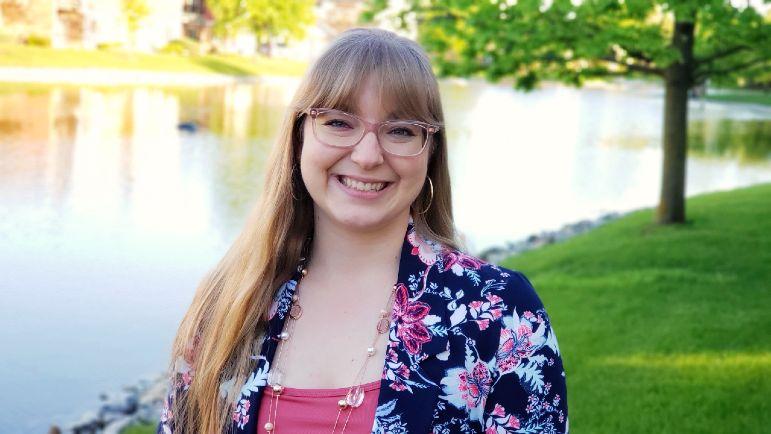In her younger years, Elizabeth Guzik thought she would carve out a career as a singer. Now she is finding her voice as a clinical researcher.
There have been plenty of twists and turns — and tunes —on Guzik’s path to a career in health care. She is set to graduate this summer with a Master of Science in Clinical Research from RUSH University and looks forward to someday applying to medical school.
Guzik recently talked about her road to RUSH, and the surprising similarities she sees between music and clinical research.
Tell us about your background.
Elizabeth Guzik: As a high school student growing up in the southwest suburbs of Chicago, I got a postcard from the University of Minnesota and decided to check out the school for my undergraduate education. I fell in love with the school and decided to enroll. I was on a totally different track then, though. I was a vocal performance major.
Music is definitely a passion of mine, but I soon realized that I didn’t want to pursue it as a career. I enjoyed science and wanted to work in a lab, so I switched to the school’s Medical Laboratory Sciences program. After graduating, I spent a year working as a medical technologist at a hospital before starting the Clinical Research master’s program at RUSH.
What else drew you to clinical research?
EG: I was always very interested in science as a kid, but I didn’t understand the career options open to me in that field until some of my college friends who were science majors started getting part-time student research positions. It sounded fun. It was a really cool way to take what I was learning in class and apply it in the real world.
I loved genetics and dogs, so I ended up working in a canine genetics lab. I was working with things I enjoy and at the same time was having an impact on lives — in this case, canine lives. We were investigating genetic mutations to help breed healthier puppies.
I got really interested in clinical research because my experiences were starting to fill that gap in my research knowledge: How do you get a treatment from the lab through into the hospital to help patients?
Have you found any similarities between music and lab research?
EG: There are certain habits and a certain mentality that are fostered with music that I think have helped in my current work. The basis of music is taking something you don't understand and breaking it down into little pieces that you gradually learn through repetition. Then everything comes together to create these beautiful masterpieces.
In research it’s sort of the same thing. You have a huge concept that seems scary and looks overwhelming. Maybe you don't understand everything, but you start breaking it down into little pieces. And through that you ask yourself, “What techniques do I use here, and how do I best use that technique?”
All of that bridges to the nitty gritty of repeating the technique so you can get your hands around it. You’re then able to perform the technique consistently enough to get answers to your research questions and complete your thesis or research paper. You end up with a sort of masterpiece at the end in the same way you do when you sing Mozart.
What has your experience at RUSH been like?
EG: I’ve been really, really happy at RUSH. One of my favorite things is the Graduate College’s Peer Mentor Program. That helps so much when you're finding your way and adjusting to life as a graduate student. As an incoming student, you’re paired with a second-year student-mentor, who helps explain things like registering for classes and provides a lot of insight. My mentor introduced me to a couple of other second-year students, and it really helped build more of a sense of community so that I didn’t get lost in the shuffle.
And the professors at RUSH have been wonderful. They're all extremely supportive and really helpful. I feel like everyone is cheering for us to do well so we can take what we're learning in class and employ it in the workforce.
What do you see yourself doing once you graduate?
EG: Eventually I really want to apply to medical school, but I want to take a little bit of a break from school after I graduate. In the meantime, I’m interested in working at perhaps a specialty lab, particularly a pathology lab.
I’m looking at HLA labs, which look at the markers on your cells that let your body know that you are you. When you have things in your body that don’t express the HLA markers, the body knows they aren’t supposed to be there. Then the body responds accordingly. HLA labs look at that in the context of organ transplants — helping to determine the best donors for people who are waiting for organ transplants.
What advice would you give to someone interested in following a similar path?
EG: Don't shy away from opportunities that are presented. I have had this super twisty, turny experience to get where I am, and I wouldn't change a thing. Whenever there was an interesting opportunity presented, I decided to check it out even though I didn’t totally know how I would be able to apply it. In the end, you’re usually better off for it.
In the case of music, I can take practice techniques I have learned and apply that to learning lab techniques. And there is so much about this world that we just don't even know about. You might figure some of that out, whether it’s through a career opportunity or volunteer experience. You're going to take whatever experience you have and make it your own in unexpected ways.

